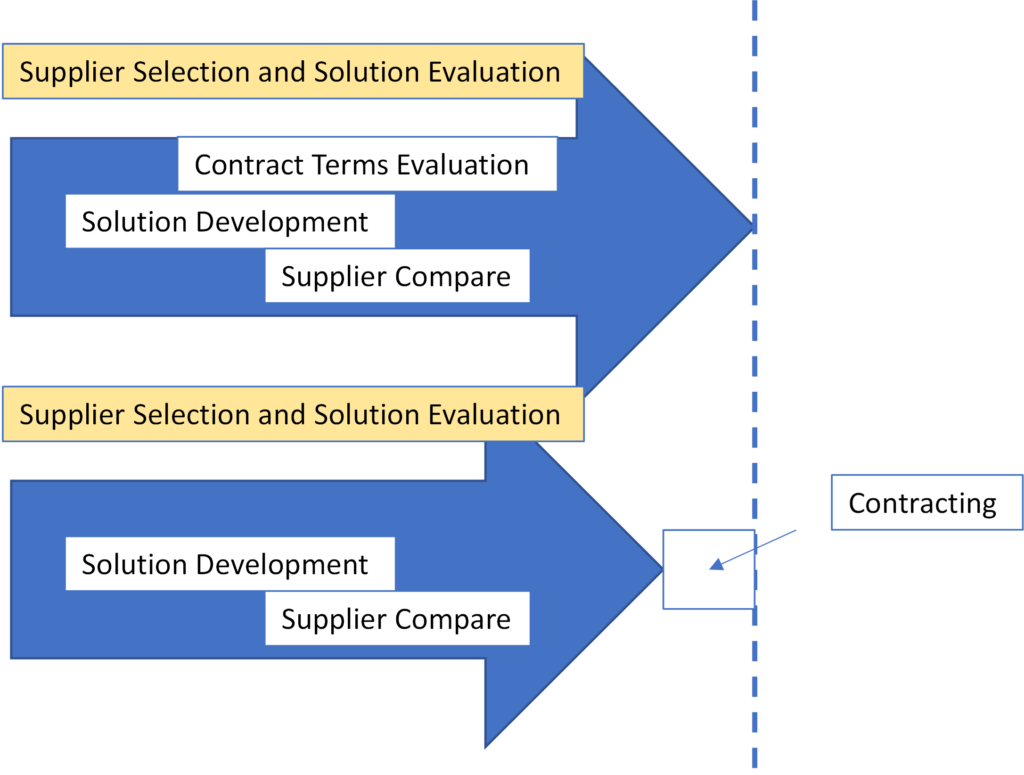Over recent years the move to cloud based packaged solutions to fulfill IT service needs has accelerated the sales process and client decision cycles. With a standardized solution there is less to talk about, it’s quicker to implement, let’s get going ! Just sign here and we can get started says the supplier.
Not so fast…… The days of six month plus outsourcing competitions may be over but it is still important to take a little bit of time over the contract. Not all cloud based solutions are mission critical but the contract still deserves a little more attention than a click through agreement, if your cloud solution has any element that is even slightly mission critical, then the contract deserves some serious attention.

The best approach is that a detailed contract evaluation is a part of your overall supplier selection process, and you get to push on important issues while you have maximum leverage. However not everyone in IT builds this into the process. Even if you leave the contract until the end, when the supplier is chosen, you can still gain considerable ground with an informed contracting approach, and it does not have to slow down implementation
Cloud suppliers are quick to leverage the supposed ‘standardization’ of their offerings. They position the contract as being the ‘same as everyone signs’ and present perceived barriers to challenging or negotiating terms. These barriers can and should be overcome. The first contract they put in front of you will likely be completely one sided in terms of flexibility and risk allocation. Do not just agree to it. Whatever the sales guy might say cloud solution suppliers are used to push back, and have whole sets of much more client balanced terms if you know where to push and have the knowledge to ask.
Whether you do it internally or bring someone in, I have listed below some of the most common contract terms that cloud suppliers do not offer, unless pressed.
- Description of Services – sounds obvious but many initial contracts are quite vague on what services exactly the supplier will perform. Indeed, many contracts have a bigger list of client obligations . The contract needs to be clear and specific on services the supplier will provide, ideally with a detailed RACI chart(s).
- Performance Obligations and SLA’s – Performance obligations need to be clear, SLA’s should mean something. SLA’s that are targets and have no consequences are next to useless. SLA’s with numbers should be well thought through. 99% availability allows 432 minutes of downtime per month, each 0.1% after that reduces it by 43 minutes, 99.9% availability allows 43 minutes downtime per month, which are you expecting?
- Governance and Reporting – This area is notoriously under described in cloud contracts, maybe you get access to a portal and you can go look things up! Is that enough, really? Be clear about what you are expecting about types of meetings, frequency, types of reporting, responsibility to produce, etc.
- Pricing Approach – Not just the actual $ values but the way you are charged, when you are charged, etc. Is there enough granularity if things change, can you add storage, switch off servers? Lack of flexibility in pricing approach is likely to severely reduce your leverage once the contract starts and those friendly sales guys are long gone.
There are clearly many more contract areas to press on. Taking the time, while you have leverage, to work on these can bring significant benefits. SHC is clearly ready and waiting to help.
